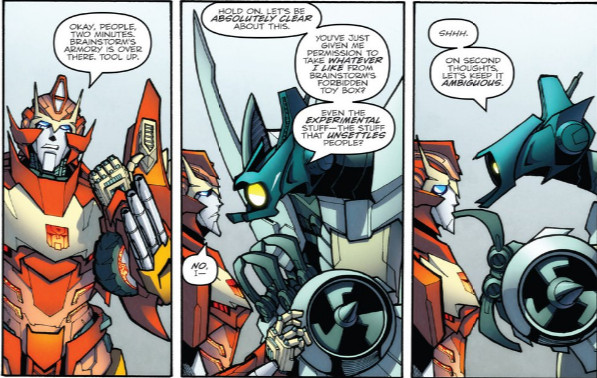@il-volpe said:
@Roz said:
I believe strongly that the appearance of fairness is just as important as fairness in practice.
Is this even possible? I had someone, very courteously and with the best intention of helping me not to suck, inform me that I shouldn't make policies to benefit my friends. In response to a change that everyone hated short-term, because it spread out stat points and effectively weakened all characters. And which my friend, whom they believed I was benefiting with the change, bitched about more than anyone. (Likely because, being my friend, he felt safe to bitch.)
I had somebody post on WORA about how I refused to ban someone because I 'wanted her to like' me while I was willing to ban others. The actual difference was not that I cared especially if non-banned player liked me, but that she actually corrected her irritating behaviors, and then produced other ones due to an inability to generalize, while those I banned refused to accept and comply with my rulings.
The whole balance of transparency vs privacy seems to lead to people accusing one of unfairness. Either that or one has to make any discussion one has with a player about any unwelcome behavior some sort of ugly free-for-all town-hall-meeting thing, which I am not about to do.
Agreed. It all boils down to perception. I work with a policy of having minor things (like violating channel ratings) dealt with in private through pages, especially with first time violators, because it gives them a chance to correct themselves without some big board post about "THIS BEHAVIOR IS NOT TOLERATED YOU KNOW WHO YOU ARE" or other forms of public chastisement. It works well for the people being corrected; they get a chance to not look like a turd in front of others. This practice, however has generated players who have done something worthy of being called out in public complain bitterly to me about how I "don't correct other people as harshly as them" and others still who complain to me about how I "never enforce the rules" simply because they don't see it openly.
I've come to see in the last few months that being hung up on the appearance of fairness has actually hamstrung me from doing what flat out needs to be done.
Perception issues are the same reason I hate the "don't be a dick" rule I see on some games. It is precisely because what constitutes being a "dick" varies from staffer to staffer, game to game, and it can be interpreted to whatever that staffer wants it to mean at the time. "I'm mad at you because you had a valid point in your argument on my policy change so you're a dick. Banned". I think I'd much rather see "I reserve the right to ban you at any time for whatever reason I feel like." It's the unstated bedrock truth of any game, really, but this is refreshingly honest and upfront (and will warn me ahead of time of what kind of emotionally-driven, weaselicious staff decisions said game administration will be making).
I am in full agreement with @Derp: Know the exact scope of the problem that you're attempting to address, and craft a rule based on that scope. Hold people to a clearly stated set of rules and expectations, give a fair warning whenever possible, and then act. The documentation concept is a really good idea - I think I'll implement that on my own game.
@Derp said:
I've heard complaints by staffers to the effect of "Well, we don't feel like making everything public." This is also poor form. It's a public game, in most instances. You don't have to divulge every dirty secret that happens behind the ST screen (for instance, player names can be changed to protect the innocent or not-so-innocent), but the methodologies employed should absolutely be visible. Staffers also like to sometimes use the idea that players will reject the reasoning of the rule, and so not make those details public. I find this equally silly. Players are intelligent, and they are as invested and well-versed in the game as the staff is. Sometimes even moreso. . Those processes should be open to player review if for no other reason than it is perfectly likely that one of your players could craft a better alternative than the one that the staffers did. This is not something to be feared. This is something to be encouraged. This means that your players are active, participatory, and feel like they have the power to make real contributions to the gaming environment. That is an excellent way to encourage player participation.
I absolutely love this and agree, I've tried to do it, but I think this only works on certain game themes. With nWoD/WoD, you're all playing by the same ruleset and the same expectations, and you attract a specific kind of player who is naturally invested in making the game better - they probably tabletop at home with friends. There are other game themes in which the players attracted are expecting you to create a kind of World of Warcraft MMO, where they log in to perform "raids" in play and little else, and they have nothing to contribute to the decision-making process even if you strap them into a chair and try to force suggestions out of them. They're otherwise active, following the rules and enjoying themselves, but forget asking them for better ideas. They don't have any.


 Sounds interesting.
Sounds interesting.